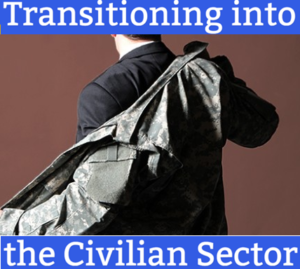
By Debbie Gregory.
Transitioning from the military is an exciting time in your life, but it can also be a little intimidating. In order to help you achieve success, here are some tips to help you navigate your way into your new civilian career:
- Deal with issues
You need to demonstrate that you are a team player and are engaged with the company’s needs. Learn the company’s issues and priorities, and how you can contribute to dealing with both.
- Don’t judge a book by it’s cover
Unlike the military, there are no uniforms with rank that reveal someone’s position within the organization. Until you’ve been with an organization for a while and have figured out who is who, treat everyone as if they are the boss.
- Don’t rely on military terms
While addressing those at work as “sir” and “ma’am” will set you apart in a good way, it’s important to remember that you need to civilian-ize your speech in order to be understood.
- Loosen up a bit
Military customs and courtesies don’t often translate well in the civilian world. Gauge your behavior to your company’s social culture. If it is a bit laid back, your behavior should fit in with that. Rely on your coworkers to educate you.
- “Praise in public and punish in private” is still important
In the military, you learned that the best leaders heap praise on their teams in public and choose to go behind closed doors to make corrections. Stay with that, even though sometimes you may see the opposite.
- Don’t overshare PTSD or TBI
While your civilian counterparts at your new job may be curious and ask questions about your experiences in the military, a measured response will serve you better than too much detail. This is especially true of the invisible wounds, such as PTSD and TBI. Private information should be shared on a need-to-know basis, or in with those with whom you truly feel comfortable with. Which brings us to the next tip:
- Be prepared for off-the-wall questions
There is a large disconnect between veterans and civilians. Most civilians would never intentionally ask rude questions, but should a question come off as rude or ignorant, try to roll with it.
- Learn the company’s corporate culture
Corporate culture is comprised of the values, beliefs and attitudes that characterize the company and guide its practices. To some extent, a company’s internal culture may be articulated in its mission statement or vision statement. Learn it. Know it.
- Find out how to advance
Build a diversity of relationships and rely on those individuals for honest feedback, advice, insight, and information. Include peers inside and outside the company, higher-ups in your chain of command and in other divisions, someone in your company’s human resources department
- Join your company’s veteran affinity group
Take advantage of the camaraderie, assistance and support of your co-workers who have traveled a path similar to yours. If there isn’t one, start one. Your employer will only benefit from the support provided to their veteran employees.
Military Connection salutes and proudly serves veterans and service members in the Army, Navy, Air Force, Marines, Coast Guard, Guard and Reserve, and their families.



























